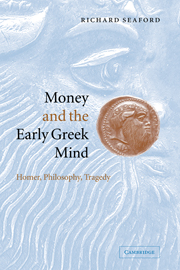Book contents
- Frontmatter
- Contents
- Preface
- List of abbreviations
- 1 Introduction
- PART ONE THE GENESIS OF COINED MONEY
- 2 Homeric Transactions
- 3 Sacrifice and distribution
- 4 Greece and the ancient Near East
- 5 Greek money
- 6 The preconditions of coinage
- 7 The earliest coinage
- 8 The features of money
- PART TWO THE MAKING OF METAPHYSICS
- References
- Index
8 - The features of money
Published online by Cambridge University Press: 22 September 2009
- Frontmatter
- Contents
- Preface
- List of abbreviations
- 1 Introduction
- PART ONE THE GENESIS OF COINED MONEY
- 2 Homeric Transactions
- 3 Sacrifice and distribution
- 4 Greece and the ancient Near East
- 5 Greek money
- 6 The preconditions of coinage
- 7 The earliest coinage
- 8 The features of money
- PART TWO THE MAKING OF METAPHYSICS
- References
- Index
Summary
WALKING ON THE TEXTILES IN AESCHYLUS' AGAMEMNON
The use of precious metal money in the advanced city-states was in the sixth and fifth centuries accelerated and made pervasive by the invention and rapid spread of coinage. The result was a single thing of unique status, money, that could be exchanged for, and measure the value of, numerous other things. Having in 1a described the fundamental similarity of Greek and modern money, in 1c I gave an extended definition of money that applies to them both. On this basis I will now describe several salient features of Greek money that are also features of modern money. For the Greeks of this period money had developed rapidly, and much in their continuing traditions (notably Homer) predated it. And so in the texts given below (mostly from the fifth century) they express, often in subtle ways, the features of this relatively recent phenomenon, without always explicitly stating or conceptualising them. These are features that we ourselves may not register because we take money more completely for granted.
This expression of the features of money occurs especially in Athenian tragedy, which – though dramatising the largely premonetary world of epic and of myth generally – was the first genre to be created in the brave new world of the widespread use of coined money (7b), and – as an increasingly complex performance at a civic festival – itself required considerable monetary expenditure.
- Type
- Chapter
- Information
- Money and the Early Greek MindHomer, Philosophy, Tragedy, pp. 147 - 172Publisher: Cambridge University PressPrint publication year: 2004



